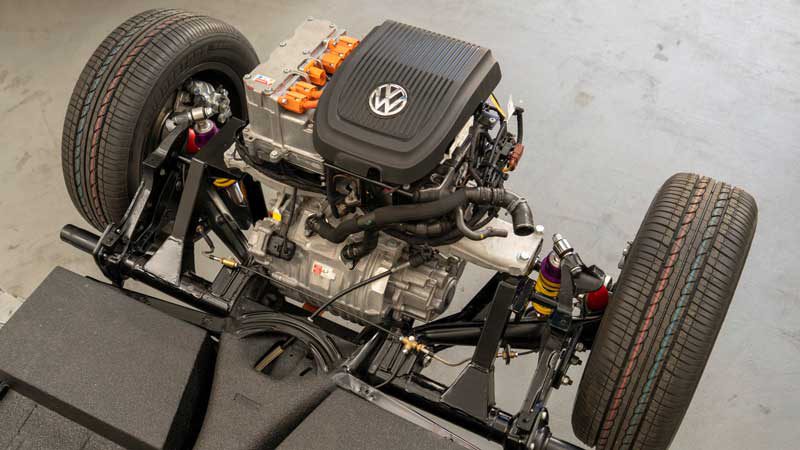German carmaker Volkswagen is breathing new life into its iconic Beetle, presenting it in an electric concept form with a view to offering similar conversion to private owners of the much-loved vehicle.
Using new components based on those of the upcoming EV offering known as the e-Up!, the electric Beetle concept was created by the carmaker’s Volkswagen Group Components (VGC) in partnership with Stuttgart-based EV conversion company eClassics.
“The electrified Beetle combines the charm of our classic car with the mobility of the future,” said Thomas Schmall, board member of Volkswagen Group Components in a statement.
“Innovative e-components from Volkswagen Group Components are under the bonnet – we work with them to electrify historically important vehicles, in what is an emotional process. We are also providing Beetle owners with a professional conversion solution, using production parts of the highest quality.”
Kitted out with an electric drive, the 1-speed gearbox made at VGC’s Kassel plant and battery system supplied from VGC’s Brunswick site, the electric Beetle boasts a 36.8kWh battery in 14 modules.

The extra weight of the battery unsurprisingly entailed a rework of the chassis and brakes, with the result that the e-Beetle can accelerate to 50km/hr from standing in 4 seconds and 80km/hr in just over eight seconds.
Let’s face it, the Beetle was never known for being particularly quick, although VW does say it can still reach a top speed of 150 km/h.
Driving range is a humble 200km, although ample enough as the carmaker puts it, “a comfortable distance for a relaxing day out in an electrified classic car”.

Should the e-Beetle Sunday driver need to recharge when out, never fear – VGC has ensured that the vehicle has fast charging capacity using a CCS2 plug.

Sounds like a great option for those not wanting to convert their own Beetle, as Australia’s Nick Lake did.
It might not be the only vintage vehicle to be re-energised by VGC’s conversion solution, either.
Based on this concept, the subsequent electrification of other historic vehicles will also be possible.
Schmall says: “We are already working together to prepare the platform for the Bus. An e-Porsche 356 could also be pursued in the future.” The use of the modular electric drive matrix (MEB) is also being considered. This creates additional opportunities regarding performance and range.

Bridie Schmidt is associate editor for The Driven, sister site of Renew Economy. She has been writing about electric vehicles since 2018, and has a keen interest in the role that zero-emissions transport has to play in sustainability. She has participated in podcasts such as Download This Show with Marc Fennell and Shirtloads of Science with Karl Kruszelnicki and is co-organiser of the Northern Rivers Electric Vehicle Forum. Bridie also owns a Tesla Model Y and has it available for hire on evee.com.au.


